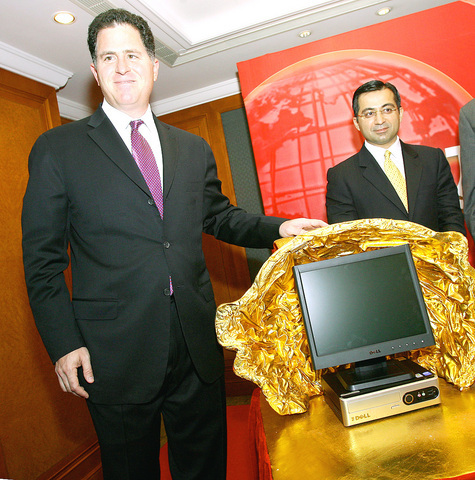Dell Inc, the second-biggest PC maker in the world, has started selling a cheap model in China to expand in a market where more than 90 percent of the population doesn't own PCs.
The computer, powered by an Intel Corp processor, was set be sold for between 2,599 yuan (US$336) and 3,999 yuan starting yesterday, Round Rock, Texas-based Dell said in a statement issued in Shanghai.
The price is 69 percent cheaper than the lowest priced model on Dell's China Web site.

PHOTO: AFP
Dell is seeking to bolster sales through low-cost computers in developing markets as earnings growth slowed. Founder Michael Dell returned as chief executive officer in January to help the company regain the market lead after losing it to Hewlett-Packard Co in the fourth quarter last year.
"Faster sales growth in China could really give Dell a boost because of how big the market is and how much potential it has," William Bao Bean, an analyst with Deutsche Securities Co in Hong Kong, said before the briefing. "Smaller cities and towns are really where the growth is in China because incomes are rising and people are shopping for their first computers."
He rates Lenovo Group Ltd (
"We have a lot of opportunity" in the consumer market, Michael Dell told reporters in Shanghai yesterday.
"You'll see a lot more products" like the new PC introduced today, he said.
Dell is visiting Shanghai to introduce the new model and meet with customers.
The new computer, developed in China, consumes less electricity, takes up less work space and was made with first-time users in mind, the company said.
The company is also looking to sell the same computer in other emerging markets such as India and Brazil, said Alex Yung, Dell's China head of small business sales.
Michael Dell said yesterday the company also plans to buy companies to boost its services unit, helping to expand sales outside of its main business of selling PCs. The services business, which includes setting up computer networks and providing customer support, has annual sales of about US$6 billion.
"I'd expect to see acquisitions there," Michael Dell said.
He didn't identify countries or target companies.
About seven in 100 people own PCs in China, compared with two in 100 for India, the company said on Tuesday.
About 25 million PCs were sold in China last year, four times the 6 million in India, it said.
Dell's revenue in China rose 26 percent in the last fiscal year, it said in the release, without specifying an amount. In the fourth quarter ended Feb. 2, the Americas accounted for 61 percent of Dell's sales, down from 64 percent a year earlier.
Asia accounted for 12 percent for both periods.
Shares of Dell rose 0.3 percent to US$22.53 on the New York Stock Exchange composite trading on Tuesday. The stock has gained 5.1 percent in the past six months.
The company ousted former CEO Kevin Rollins after less than three years and reinstated founder Dell on Jan. 31, the same day it said sales and profit would miss forecasts for the fourth quarter.
Net income for the quarter ended Feb. 2 fell 37 percent to US$637 million from US$1.01 billion a year earlier, while sales declined to US$14.4 billion from US$15.2 billion, the company reported. The earnings are preliminary because of an accounting investigation.

The Central Weather Administration (CWA) yesterday said it expected to issue a sea warning for Typhoon Fung-Wong tomorrow, which it said would possibly make landfall near central Taiwan. As of 2am yesterday, Fung-Wong was about 1,760km southeast of Oluanpi (鵝鑾鼻), Taiwan’s southernmost point, moving west-northwest at 26kph. It is forecast to reach Luzon in the northern Philippines by tomorrow, the CWA said. After entering the South China Sea, Typhoon Fung-Wong is likely to turn northward toward Taiwan, CWA forecaster Chang Chun-yao (張峻堯) said, adding that it would likely make landfall near central Taiwan. The CWA expects to issue a land

Taiwan’s exports soared to an all-time high of US$61.8 billion last month, surging 49.7 percent from a year earlier, as the global frenzy for artificial intelligence (AI) applications and new consumer electronics powered shipments of high-tech goods, the Ministry of Finance said yesterday. It was the first time exports had exceeded the US$60 billion mark, fueled by the global boom in AI development that has significantly boosted Taiwanese companies across the international supply chain, Department of Statistics Director-General Beatrice Tsai (蔡美娜) told a media briefing. “There is a consensus among major AI players that the upcycle is still in its early stage,”

The Central Weather Administration (CWA) yesterday said it is expected to issue a sea warning for Typhoon Fung-wong this afternoon and a land warning tomorrow. As of 1pm, the storm was about 1,070km southeast of Oluanpi (鵝鑾鼻), Taiwan’s southernmost point, and was moving west-northwest at 28 to 32kph, according to CWA data. The storm had a radius of 250km, with maximum sustained winds of 173kph and gusts reaching 209kph, the CWA added. The storm is forecast to pass near Luzon in the Philippines before entering the South China Sea and potentially turning northward toward Taiwan, the CWA said. CWA forecaster Chang Chun-yao (張峻堯) said

PREPARATION: Ferry lines and flights were canceled ahead of only the second storm to hit the nation in November, while many areas canceled classes and work Authorities yesterday evacuated more than 3,000 people ahead of approaching Tropical Storm Fung-wong, which is expected to make landfall between Kaohsiung and Pingtung County this evening. Fung-wong was yesterday morning downgraded from a typhoon to a tropical storm as it approached the nation’s southwest coast, the Central Weather Administration (CWA) said, as it issued a land alert for the storm. The alert applies to residents in Tainan, Kaohsiung, Pingtung and Taitung counties, and the Hengchun Peninsula (恆春). As of press time last night, Taichung, Tainan, Kaohsiung, and Yilan, Miaoli, Changhua, Yunlin, Pingtung and Penghu counties, as well as Chiayi city and county had